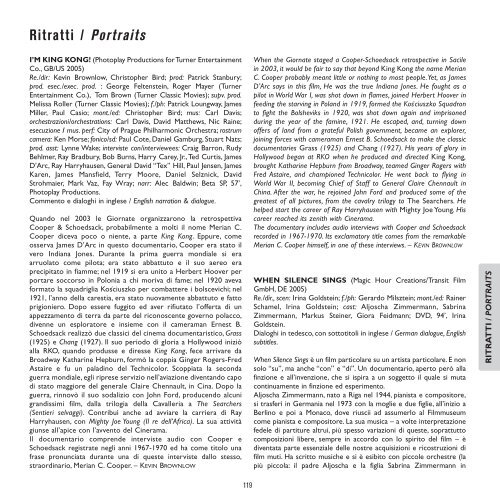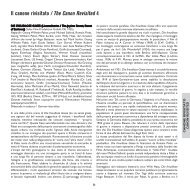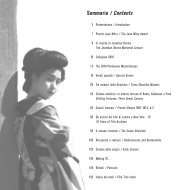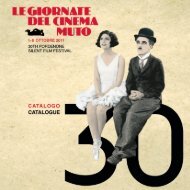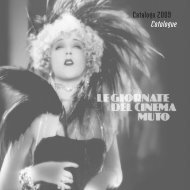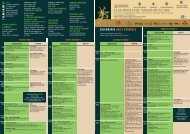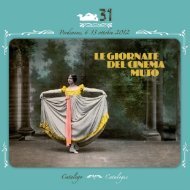Le Giornate del Cinema Muto 2005 Sommario / Contents
Le Giornate del Cinema Muto 2005 Sommario / Contents
Le Giornate del Cinema Muto 2005 Sommario / Contents
Create successful ePaper yourself
Turn your PDF publications into a flip-book with our unique Google optimized e-Paper software.
Ritratti / Portraits<br />
I’M KING KONG! (Photoplay Productions for Turner Entertainment<br />
Co., GB/US <strong>2005</strong>)<br />
Re./dir: Kevin Brownlow, Christopher Bird; prod: Patrick Stanbury;<br />
prod. esec./exec. prod. : George Feltenstein, Roger Mayer (Turner<br />
Entertainment Co.), Tom Brown (Turner Classic Movies); supv. prod.<br />
Melissa Roller (Turner Classic Movies); f./ph: Patrick Loungway, James<br />
Miller, Paul Casio; mont./ed: Christopher Bird; mus: Carl Davis;<br />
orchestrazioni/orchestrations: Carl Davis, David Matthews, Nic Raine;<br />
esecuzione / mus. perf: City of Prague Philharmonic Orchestra; rostrum<br />
camera: Ken Morse; fonico/sd: Paul Cote, Daniel Gamburg, Stuart Nats;<br />
prod. asst: Lynne Wake; interviste con/interviewees: Craig Barron, Rudy<br />
Behlmer, Ray Bradbury, Bob Burns, Harry Carey, Jr.,Ted Curtis, James<br />
D’Arc, Ray Harryhausen, General David “Tex” Hill, Paul Jensen, James<br />
Karen, James Mansfield, Terry Moore, Daniel Selznick, David<br />
Strohmaier, Mark Vaz, Fay Wray; narr: Alec Baldwin; Beta SP, 57’,<br />
Photoplay Productions.<br />
Commento e dialoghi in inglese / English narration & dialogue.<br />
Quando nel 2003 le <strong>Giornate</strong> organizzarono la retrospettiva<br />
Cooper & Schoedsack, probabilmente a molti il nome Merian C.<br />
Cooper diceva poco o niente, a parte King Kong. Eppure, come<br />
osserva James D’Arc in questo documentario, Cooper era stato il<br />
vero Indiana Jones. Durante la prima guerra mondiale si era<br />
arruolato come pilota; era stato abbattuto e il suo aereo era<br />
precipitato in fiamme; nel 1919 si era unito a Herbert Hoover per<br />
portare soccorso in Polonia a chi moriva di fame; nel 1920 aveva<br />
formato la squadriglia Kos´ciuszko per combattere i bolscevichi; nel<br />
1921, l’anno <strong>del</strong>la carestia, era stato nuovamente abbattuto e fatto<br />
prigioniero. Dopo essere fuggito ed aver rifiutato l’offerta di un<br />
appezzamento di terra da parte <strong>del</strong> riconoscente governo polacco,<br />
divenne un esploratore e insieme con il cameraman Ernest B.<br />
Schoedsack realizzò due classici <strong>del</strong> cinema documentaristico, Grass<br />
(1925) e Chang (1927). Il suo periodo di gloria a Hollywood iniziò<br />
alla RKO, quando produsse e diresse King Kong, fece arrivare da<br />
Broadway Katharine Hepburn, formò la coppia Ginger Rogers-Fred<br />
Astaire e fu un paladino <strong>del</strong> Technicolor. Scoppiata la seconda<br />
guerra mondiale, egli riprese servizio nell’aviazione diventando capo<br />
di stato maggiore <strong>del</strong> generale Claire Chennault, in Cina. Dopo la<br />
guerra, rinnovò il suo sodalizio con John Ford, producendo alcuni<br />
grandissimi film, dalla trilogia <strong>del</strong>la Cavalleria a The Searchers<br />
(Sentieri selvaggi). Contribuì anche ad avviare la carriera di Ray<br />
Harryhausen, con Mighty Joe Young (Il re <strong>del</strong>l’Africa). La sua attività<br />
giunse all’apice con l’avvento <strong>del</strong> Cinerama.<br />
Il documentario comprende interviste audio con Cooper e<br />
Schoedsack registrate negli anni 1967-1970 ed ha come titolo una<br />
frase pronunciata durante una di queste interviste dallo stesso,<br />
straordinario, Merian C. Cooper. – KEVIN BROWNLOW<br />
119<br />
When the <strong>Giornate</strong> staged a Cooper-Schoedsack retrospective in Sacile<br />
in 2003, it would be fair to say that beyond King Kong the name Merian<br />
C. Cooper probably meant little or nothing to most people.Yet, as James<br />
D’Arc says in this film, He was the true Indiana Jones. He fought as a<br />
pilot in World War I, was shot down in flames, joined Herbert Hoover in<br />
feeding the starving in Poland in 1919, formed the Kos´ciuszko Squadron<br />
to fight the Bolsheviks in 1920, was shot down again and imprisoned<br />
during the year of the famine, 1921. He escaped, and, turning down<br />
offers of land from a grateful Polish government, became an explorer,<br />
joining forces with cameraman Ernest B. Schoedsack to make the classic<br />
documentaries Grass (1925) and Chang (1927). His years of glory in<br />
Hollywood began at RKO when he produced and directed King Kong,<br />
brought Katharine Hepburn from Broadway, teamed Ginger Rogers with<br />
Fred Astaire, and championed Technicolor. He went back to flying in<br />
World War II, becoming Chief of Staff to General Claire Chennault in<br />
China. After the war, he rejoined John Ford and produced some of the<br />
greatest of all pictures, from the cavalry trilogy to The Searchers. He<br />
helped start the career of Ray Harryhausen with Mighty Joe Young. His<br />
career reached its zenith with Cinerama.<br />
The documentary includes audio interviews with Cooper and Schoedsack<br />
recorded in 1967-1970. Its exclamatory title comes from the remarkable<br />
Merian C. Cooper himself, in one of these interviews. – KEVIN BROWNLOW<br />
WHEN SILENCE SINGS (Magic Hour Creations/Transit Film<br />
GmbH, DE <strong>2005</strong>)<br />
Re./dir., scen: Irina Goldstein; f./ph: Gerardo Milsztein; mont./ed: Rainer<br />
Schamel, Irina Goldstein; cast: Aljoscha Zimmermann, Sabrina<br />
Zimmermann, Markus Steiner, Giora Feidmann; DVD, 94’, Irina<br />
Goldstein.<br />
Dialoghi in tedesco, con sottotitoli in inglese / German dialogue, English<br />
subtitles.<br />
When Silence Sings è un film particolare su un artista particolare. E non<br />
solo “su”, ma anche “con” e “di”. Un documentario, aperto però alla<br />
finzione e all’invenzione, che si ispira a un soggetto il quale si muta<br />
continuamente in finzione ed esperimento.<br />
Aljoscha Zimmermann, nato a Riga nel 1944, pianista e compositore,<br />
si trasferì in Germania nel 1973 con la moglie e due figlie, all’inizio a<br />
Berlino e poi a Monaco, dove riuscii ad assumerlo al Filmmuseum<br />
come pianista e compositore. La sua musica – a volte interpretazione<br />
fe<strong>del</strong>e di partiture altrui, più spesso variazioni di queste, soprattutto<br />
composizioni libere, sempre in accordo con lo spirito <strong>del</strong> film – è<br />
diventata parte essenziale <strong>del</strong>le nostre acquisizioni e ricostruzioni di<br />
film muti. Ha scritto musiche e si è esibito con piccole orchestre (la<br />
più piccola: il padre Aljoscha e la figlia Sabrina Zimmermann in<br />
RITRATTI / PORTRAITS


